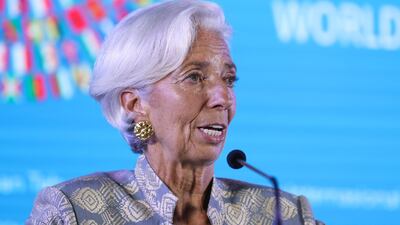Policymakers should prepare for more market volatility amid further financial tightening and “choppy” waters in the global economy stemming from trade tensions, said Christine Lagarde, managing director of the International Monetary Fund.
The fund’s advice to central bankers and finance chiefs is to continue building monetary and fiscal buffers for the risks ahead, she said at the conclusion of the IMF and World Bank meetings in Bali, Indonesia.
“Now is not the time to say, 'OK, fine, let’s just relax and do a bit of fiscal tolerance here and a slowing of reforms',” Ms Lagarde said. On the trade disputes, she said “our message was very clear: de-escalate the tensions, and open and reform the dialogue”.
_________________
Read more:
China won't use currency as tool in trade war, Yi says
Next global financial crash may be staring us in the face
_________________
The Bali meetings have been dominated by talk of the twin risks of trade and monetary policy tightening, coming in a week in which stock markets from the US to Asia were roiled as investors sought cover. Officials including Bank of Japan governor Haruhiko Kuroda urged the US and China to re-start talks around trade, while policymakers from emerging markets highlighted threats from Federal Reserve-led interest rate hikes.
As for officials’ ability to deal with the next financial crisis, Ms Lagarde said there is “still, now, limited policy space” but that the banking system is “much stronger” with better supervision and regulations, less non-performing loans and “still sensible” leverage.
Flexible exchange rates are playing a “very good role as a shock absorber,” she said.
“There are risks out there in the system, of course, and we need to be mindful of that, and we need to make sure the buffers are rebuilt,” Ms Lagarde said.
“It’s time to buckle up.”

